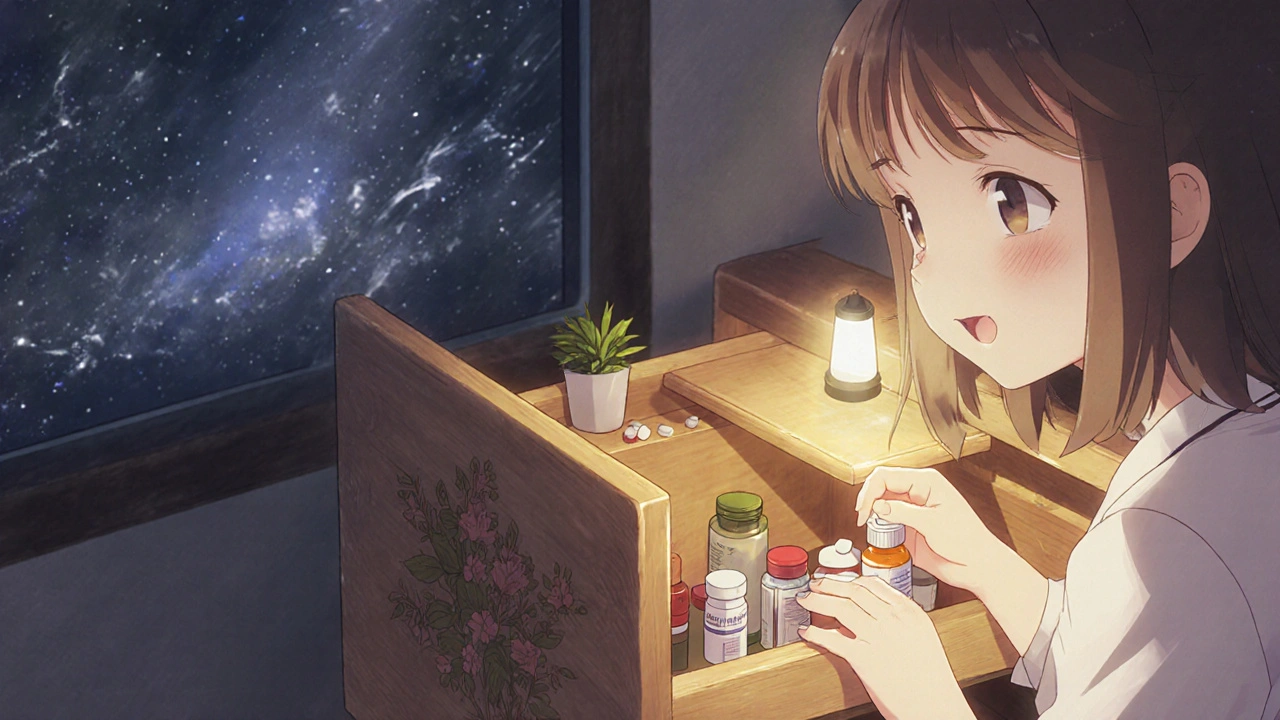Most people keep their medications in the bathroom. It’s convenient - right next to the sink, easy to reach after brushing your teeth. But if you’re storing pills, patches, or insulin in that medicine cabinet, you’re risking more than just a missed dose. You’re risking your health.
Moisture Is Killing Your Medicine
Bathrooms are humid. Every time you shower, steam fills the air. Humidity levels can jump from 40% to over 90% in minutes. That moisture doesn’t just fog up your mirror - it seeps into your pills. Tablets absorb water and start breaking down. Capsules get sticky or brittle. Powders clump. Insulin, a protein-based drug, loses its structure when exposed to heat and moisture. Nitroglycerin, used for heart attacks, can become useless in just a few weeks in a steamy cabinet.Studies show that medications stored in bathrooms lose up to 27% of their potency within six months. For something like birth control pills, that’s not just inconvenient - it’s dangerous. FDA testing found humidity exposure can reduce contraceptive effectiveness by up to 35%. If your pill doesn’t work, you’re not just at risk of pregnancy. You’re at risk of unintended consequences that could change your life.
Temperature Swings Are a Silent Threat
Your bathroom isn’t just humid - it’s unpredictable. When you run hot water, the temperature spikes. A room that’s 70°F can hit 95°F in seconds. Medications are designed to stay stable between 59°F and 77°F (15°C-25°C). Outside that range, chemical reactions accelerate. Blood pressure meds like beta-blockers become inconsistent. Antibiotics may not kill all the bacteria, leaving resistant strains behind. That’s one reason the World Health Organization warns about antibiotic resistance - and improper storage is part of the problem.One study in Circulation found that 30.2% of patients with poorly controlled blood pressure were storing their meds in the bathroom. Once they moved them to a cool, dry closet, their readings improved. That’s not coincidence. That’s chemistry.
Children and Pets Can Access Your Meds
A bathroom medicine cabinet isn’t locked. It’s often wide open. In homes with kids, 63% store medications within reach. In homes with pets, it’s 57%. The American Academy of Pediatrics says all medications should be locked away. But most aren’t.Controlled substances like opioids, benzodiazepines, or even strong painkillers are especially dangerous. CDC data shows 70% of misused prescription drugs come from home medicine cabinets. A child finds a pill, thinks it’s candy. A teen takes it to get high. A pet licks a dropped patch. These aren’t rare accidents. They’re predictable outcomes of poor storage.

Test Strips Don’t Lie - But They Can’t Be Trusted in the Bathroom
You might think only pills are affected. But even your glucose test strips are vulnerable. A 2021 study in the Journal of Diabetes Science and Technology found that when test strips were stored in humid bathrooms, 68% gave inaccurate readings. That means someone might think their blood sugar is fine when it’s dangerously high - or vice versa. That’s not a glitch. That’s a life-threatening error.Expired or Degraded Meds Are Worse Than Useless
Some people think if a pill still looks okay, it’s fine to use. That’s a myth. Medications don’t always show signs of degradation. A tablet can look perfect but be 40% weaker. The Great Ormond Street Hospital in London advises patients to clear out their medicine cabinets every three months. Why? Because many drugs “go off” in suboptimal conditions. Their 2022 reports linked degraded medications to 4.3% of pediatric medication errors.One Reddit user shared how their blood pressure medication stopped working after being stored in the bathroom. They kept refilling it, thinking their condition was worsening - until they moved the pills to a drawer and saw their numbers stabilize. That’s not an isolated story. Nurses report seeing physical signs of degradation - discolored pills, cracked capsules, sticky patches - in 42% of bathroom-stored meds, compared to just 8% in properly stored ones.
Where Should You Store Your Medications Instead?
The best place? A cool, dry, dark spot - away from windows, heaters, or appliances. A bedroom dresser drawer. A closet shelf. A locked cabinet in a hallway. The key is consistency. Temperature should stay within 59°F-77°F with low humidity. Avoid the kitchen - fridge door openings cause too many swings. Don’t store meds in your car. Summer heat can turn a glovebox into an oven.For medications that require refrigeration - like insulin, some eye drops, or certain antibiotics - keep them in the main part of the fridge, not the door. Use a dedicated container so they don’t get mixed with food. Don’t rely on your kitchen fridge alone - it’s not designed for pharmaceutical stability.

What About Smart Storage Solutions?
Pharmaceutical companies are catching on. Over 73% of prescription bottles now include storage instructions - up from 41% in 2015. Many now come with humidity-indicating desiccant packets. Some labels change color if exposed to unsafe temperatures. A few companies even make smart cabinets that send alerts to your phone if the environment gets too hot or humid.There are also apps now that remind you to check your storage conditions. One 2023 study found that people who used medication apps with storage reminders improved their habits by 47%. Simple tools, big impact.
What Should You Do With Old or Unused Meds?
Don’t flush them. Don’t toss them in the trash. Don’t leave them in a damp cabinet to degrade slowly. Improper disposal contaminates water supplies and harms wildlife. In the U.S. alone, an estimated $98 million worth of unused medications sit in homes.Find a drug take-back program. Many pharmacies, hospitals, and police stations offer free drop-off boxes. If none are available, mix pills with coffee grounds or cat litter in a sealed container before throwing them away. Remove personal info from bottles. And always check your local guidelines - rules vary by region.
This Isn’t Just About Convenience - It’s About Safety
Storing meds in the bathroom isn’t just outdated. It’s dangerous. It’s not a minor oversight. It’s a public health risk that affects potency, safety, and even environmental health. You wouldn’t leave your insulin in the sun. You wouldn’t store antibiotics in a steam room. So why do you keep them in the bathroom?Move them. Now. Pick a drawer. A cabinet. A shelf. Anywhere that’s cool, dry, and out of reach. Your body depends on those pills working exactly as they should. Don’t let humidity and heat sabotage your health.
Can I store my medications in the kitchen cabinet?
Only if it’s away from the stove, sink, or window. Kitchens have heat from appliances and moisture from cooking. If your cabinet is near the dishwasher or stove, it’s too hot. A cabinet in a cool, dry corner - like a pantry far from the stove - is better than the bathroom, but still not ideal. A bedroom drawer is safer.
What if my medication says "store at room temperature"?
"Room temperature" means 59°F-77°F (15°C-25°C). A bathroom doesn’t qualify. Even if the label doesn’t say "avoid humidity," that doesn’t mean it’s safe. Most manufacturers assume you’ll store it properly. Bathrooms consistently exceed safe limits. Don’t assume the label overrides environmental reality.
Do all medications degrade the same way in humidity?
No. Some are more sensitive than others. Insulin, nitroglycerin, birth control pills, and antibiotics are especially vulnerable. Liquid medications, patches, and suppositories degrade faster than solid tablets. But even sturdy pills like ibuprofen can absorb moisture over time, affecting how quickly they dissolve in your body. When in doubt, assume it’s at risk.
How do I know if my medicine has gone bad?
Look for changes: pills that are discolored, cracked, or sticky; capsules that are swollen or leaking; powders that are clumped; liquids that are cloudy or have particles. But don’t wait for visible signs. Many degraded meds look perfect. If it’s been stored in the bathroom for more than a few months, replace it. Better safe than sorry.
Is it okay to store meds in the fridge?
Only if the label says to. Most don’t need refrigeration. Fridges can be too cold or too moist. If you must refrigerate, keep it in the main compartment, not the door. Use a sealed container to prevent moisture. Never store meds in the freezer unless instructed - freezing can destroy some drugs.

Comments (13)
Jim Oliver
November 9, 2025 AT 07:33
Let me guess-you store your insulin next to your toothbrush? Classic. The bathroom isn’t a medicine cabinet-it’s a steam sauna for chemical decay. You’re not being lazy; you’re just scientifically incompetent.
William Priest
November 9, 2025 AT 14:46
bro i just keep my pills in the bathroom cause its easy and i dont wanna think about it. also my cat keeps eating them so maybe its a feature not a bug??
Ryan Masuga
November 11, 2025 AT 04:08
Wow this is actually super helpful. I never realized how much humidity affects meds. I just moved my blood pressure pills to a drawer in my bedroom-felt like a small win for my health. Thanks for laying it out so clearly!
Jennifer Bedrosian
November 13, 2025 AT 00:57
OMG I just realized I’ve been storing my birth control in the bathroom for 5 years?? I’m so mad at myself right now. I’m literally crying. This is the worst thing I’ve ever done for my body 😭
Lashonda Rene
November 14, 2025 AT 22:13
you know i always thought the bathroom was fine because it was clean and i could see it when i brushed my teeth but now i realize that the steam and the heat are actually killing the medicine and i feel really stupid for not knowing this before but i guess i just never thought about it like that and now i’m going to move everything to my nightstand and i hope i don’t forget
Andy Slack
November 16, 2025 AT 09:12
Move your meds. Now. Not tomorrow. Not after your next shower. Right now. Your body is counting on you to do this one simple thing. Do it.
Rashmi Mohapatra
November 17, 2025 AT 23:04
you americans are so dramatic about pills i mean in india we keep everything in the kitchen near the stove and nothing bad happens
Abigail Chrisma
November 18, 2025 AT 03:00
Thank you for sharing this. As someone who works with elderly patients, I’ve seen too many cases where degraded meds led to hospitalizations. Moving meds to a cool, dry place isn’t just advice-it’s preventive care. Small change, huge impact.
Ankit Yadav
November 18, 2025 AT 11:51
Interesting point about test strips. I’m diabetic and never thought about humidity affecting them. I’ve been keeping mine in the bathroom since diagnosis. Guess I’m changing that today. Thanks for the nudge.
Meghan Rose
November 19, 2025 AT 09:56
I know you mean well but honestly I just don’t have the energy to reorganize my entire medicine cabinet. I’m tired. Can’t we just… let people live? I’m not dying from humidity.
Steve Phillips
November 19, 2025 AT 17:09
Let’s be real: storing meds in the bathroom is the equivalent of leaving your laptop in a sauna. And yet, people do it. With pride. As if humidity were some kind of ritual. The FDA should issue a public service announcement starring a crying insulin vial.
Rachel Puno
November 20, 2025 AT 13:38
My grandma used to say, "If it ain’t broke, don’t fix it." But this? This is broken. I moved my meds to the top drawer of my dresser last week. My BP dropped 10 points. I’m not just grateful-I’m amazed.
Clyde Verdin Jr
November 21, 2025 AT 15:12
So… you’re telling me the entire medical establishment is just trying to control us? What’s next? They’ll tell us not to breathe oxygen? This is fear-mongering dressed up as science. I’ll keep my pills where I want.